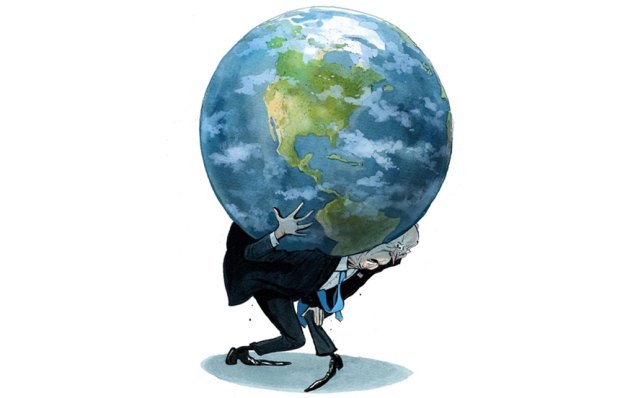My default mood at the moment is bleak despair, although it can sometimes be triggered into nihilistic loathing, which I think I mildly prefer. The most recent occasion this happened was last Monday when I drove through torrential rain to three retail parks in search of an item which – as I found out later – didn’t actually exist. While turning the car around to drive home I switched on the radio and Stephen Fry was bashfully admitting to some fawning sap of an interviewer how bloody brilliant he was. Triggered, right there, at the roundabout where you enter the old coal-mining village of Pity Me. It took ages for the bleak despair to re-establish itself.
That night I watched the TV adaptation of Ben Macintyre’s excellent book A Spy Among Friends, set in 1963, and failed to be triggered into nihilistic loathing even by the gratuitous insertion of a major female character who, the credits informed us at the end, ‘did not exist’. Further, a made-up female character whose husband was a West Indian doctor, over here to save the NHS, of course. They cannot help themselves, these screenwriters. They insist upon genuflecting to political correctness and rewriting history so that it fits in with their inane ideology. Macintyre’s book is about Kim Philby – and Burgess, Blunt, Maclean et al – and thus by accident fits very neatly into a paradigm which suggests that Britain was awful back then because weak-chinned posh men ran everything. The homosexual side of the whole business was not much dealt with, which I thought a bit of a shame. For the screenwriters, I suspect it was the only thing about the spies that they found palatable. If Anthony Blunt had transitioned they’d probably be demanding we erect a statue to him.
But still, along with those interspersed bizarre TV adverts, including the one for Macmillan nurses (I really wasn’t aware that only black folks got cancer), this was just more grist to the bleak despair mill; more of the same, relentless in its manifest stupidities, in its Year Zero obsessions. The nihilistic loathing stayed away because, I suppose, I have become somewhat inured.
So it was bleak despair once again when I read the following morning that sociology is shooting up the A-level list, along with its ESN older sister, psychology. These are the two subjects da kidz want to study these days, both shooting up the list of preferences. Psychology is now the second most popular subject (largely for the dweebs who can’t cope with a proper science) and sociology is up from ninth to fifth.
In a sense, we should probably be glad that this mangled subject (Latin prefix, Greek suffix – that alone should give you a clue as to the depths of its idiocy) is proving popular with the young social justice warriors. It might keep them away from proper subjects, such as history and geography. In the past 30 years both of those disciplines have simply become yet another branch of resentment studies – in a sense a mere adjunct to sociology. They have become about real, exaggerated or imagined oppression and little else. Perhaps now, with the radicals turning to sociology, both subjects might be reclaimed.
Sociology is tendentious, half-baked, spuriously scientific, politically biased and – frankly – of no use to man or beast. I should know; I studied it at the London School of Economics and Political Science back in the early 1980s and it was as stupid then as it is now. Much like the altar at which it worships, Marxism, it is a creature of the 19th century and the desperate wish firstly to provide a ‘holistic’ view of everything and secondly to replace religious faith with science. Auguste Comte coined the word ‘sociology’ in between doing much better things with his life. Like Marx and almost every other philosopher of the 19th century, Comte was a social evolutionist: mankind develops in pre-ordained stages. That is the first flaw of the discipline – it doesn’t.
The accusations of political bias are furiously contested by those within the discipline, largely, I suspect, because they know they are true. When I studied the subject the most right-wing sociologist on the curriculum was the American Talcott Parsons, who described himself as a ‘Stevenson Democrat’ (after Adlai) and was suspected by J. Edgar Hoover of being the leader of a ring of communists at Harvard University. The rest of the stuff was pretty much down-the-line Marxism: conflict and oppression. It is remarkable how this subject still clings to the tenets of an ideology which since 1989 has been a byword for catastrophic economic failure and tyranny. But then so do the leaders of Black Lives Matter, who when railing against the concept of the ‘white saviour’ make an exception for good ol’ Karl.
The extent of that bias within the subject? A study by Jose Duarte suggested that 58 to 66 per cent of ‘social scientists’ were liberal (in the US meaning of the term) and only 5 to 8 per cent conservative. But social scientists presumably included economists, where the inherent bias is far less pronounced. A better indication might come from a study by Jon Shields of the Claremont McKenna College in California, which suggested that 12 out of a total of 6,000 sociologists were what one might call conservative.
The impulse within the discipline is always to concentrate on conflict, be it class-based or gender-based or the consequence of racial difference. There is no room for nuance: it is all a Manichaean divide between the oppressor and the oppressed. Anything which might mitigate social divides is dismissed as chimeric, much as Marx once dismissed patriotism, say, or religious faith as deluding. And when equality is reached within one or another sphere, sociology moves the goal posts to demand ever more radical forms of ‘equality’.
Well, if the kids want to spend £40,000 immersed in this liberal fantasy, it’s their call. Although what they will do with their degrees at the end is a moot point.
Got something to add? Join the discussion and comment below.
Get 10 issues for just $10
Subscribe to The Spectator Australia today for the next 10 magazine issues, plus full online access, for just $10.
You might disagree with half of it, but you’ll enjoy reading all of it. Try your first month for free, then just $2 a week for the remainder of your first year.















Comments
Don't miss out
Join the conversation with other Spectator Australia readers. Subscribe to leave a comment.
SUBSCRIBEAlready a subscriber? Log in